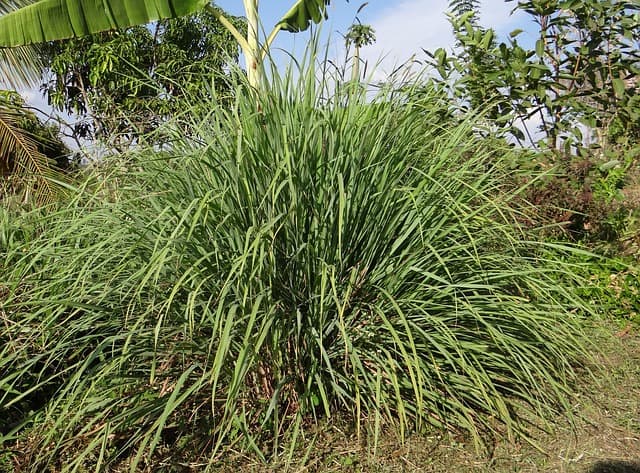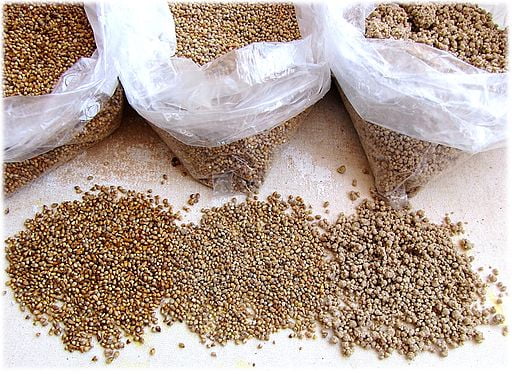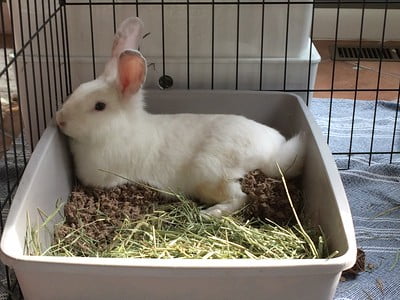Last Updated on March 5, 2023 by Marjon Ramos
My two rabbits, Tyr and Freya, love herbs. In fact, I feed them some whenever I’m cooking.
Tyr especially loves the stalks of lemongrass because it’s tough and rabbits like to grind their teeth on sticks and stalks.
Lemongrass is mostly available in Asian countries and is used in different kinds of foods like chicken, pork, and seafood dishes.
In western countries and other parts of the world, you can find lemongrass in Asian food stores.
Rabbit experts conclude that the best diet to give your rabbits needs to be close to what they eat in the wild.
Rabbits in the wild don’t have an unlimited supply of hay, so they need to supplement their diet with herbs that are available to them.
That’s why it’s important that you occasionally give them some herbs as an addition to their hay diet.
Lemongrass can be given in small quantities to rabbits, but not because it’s dangerous to them.
But because there are better herbs to give to your pet rabbit.
In this article, I will be talking about the different benefits of feeding lemongrass to your rabbits.
I will also talk about the different amounts of lemongrass based on your rabbit’s age.
And lastly, I’m going to tackle the risk of overfeeding lemongrass to rabbits and the different alternative herbs you can give to your rabbits.
So without further ado, let’s get started:
Table of Contents
What are the benefits of feeding lemongrass to rabbits?

Gist:
Lemongrass is rich in vitamin B and folate. It also contains minerals like calcium, iron, and manganese, which are great for rabbits.
Lemongrass is a great herb to give to rabbits because it contains vitamins and minerals that are great for rabbits.
Warning:
Although lemongrass has these benefits, overfeeding your rabbit is not recommended. This is only to inform you of the different vitamins your rabbit can get when you give them lemongrass.
Here are the different benefits of feeding lemongrass to rabbits:
- Vitamin B – Symptoms of rabbits that have vitamin B deficiency include diarrhea, anemia, loss of appetite, rough skin, and reduced litter size.
- Calcium – Symptoms of rabbits that have calcium deficiency include weak teeth, increased bone fractures, and bone deformities can occur.
- Iron – Iron is important in oxygen transport and metabolism. Rabbits that have an iron deficiency can result in anemia and impaired hemoglobin formation.
- Manganese – Deficiency in manganese can result in leg problems and brittle bones. It can also result in reproductive failure.
Source: Blas, Carlos de., and Julian Wiseman. The Nutrition of the Rabbit. CAB International, 1998.
How much lemongrass can a rabbit eat?
You can feed your rabbits 128 grams or 1 cup of lemongrass for every 2 pounds (1 kg) of their weight per day. But be careful that you give it to them slowly at first, because rabbits don’t tolerate sudden changes in their diet.
Adult or fully grown rabbits
Adult rabbits or rabbits that are 12 weeks to 7 months old can be given lemongrass gradually and in small amounts.
Make sure that you gradually incorporate lemongrass into their diet to avoid triggering diarrhea.
After a few weeks of slowly giving your rabbits lemongrass, you can start regularly feeding your rabbit 128 grams or 1 cup of lemongrass per 2 pounds (1 kg) of your rabbit’s body weight per day.
Young or growing bunnies
Young bunnies that are less than 12 weeks old should not eat any lemongrass. The majority of a young bunny’s diet should consist only of hay.
Since young bunnies’ gut flora is not yet developed, feeding them lemongrass could trigger gastrointestinal stasis or a bout of fatal diarrhea.
Pregnant or lactating rabbits
For pregnant or lactating rabbits, give them 128 grams or 1 cup of lemongrass per 2 pounds (1 kg) of your rabbit’s body weight every other day.
The reason why pregnant rabbits should eat less lemongrass is that they need a lot of protein, and feeding them too much lemongrass could make them full, which, in turn, would cause them to eat less food rich in protein.
When can rabbits start eating lemongrass?

Gist:
You can start giving your rabbits lemongrass at 7 months of age. Until then, just feed them hay.
Although lemongrass is a great supplement to your rabbit’s diet, it should not make up the majority of your rabbit’s diet.
Remember that your rabbit’s diet should be 80–90% hay, 5–10% leafy greens, and a small amount of treats.
Likewise, young or growing rabbits, especially those that are less than 7 months old, should only eat hay.
Preferably alfalfa or timothy hay.
Rabbits that are young have very sensitive stomachs because their gut flora is not yet accustomed to digesting different kinds of foods.
As a result, when you feed them leafy greens when they are young, you could upset the delicate balance of their gut flora and trigger a bout of diarrhea.
If your rabbit is in the growing stage, just stick to hay and water until they are fully grown.
Here’s a table that shows at what age you can feed leafy greens to your rabbit:
| Age | Hay | Pellets | Vegetables | Fruits |
|---|---|---|---|---|
| 7 weeks to 7 months | Unlimited alfalfa | Unlimited | — | — |
| 12 weeks | Unlimited alfalfa | Unlimited | Introduce vegetables (one at a time) in small quantities < 1/2 oz (15 g) | — |
| 7 months to 1 year | Introduce grass hay, decrease alfalfa | Decrease amount fed to ½ cup per 6 lbs (2.7 kg) BW | Increase vegetables fed daily gradually | No more than 1-2 oz (30-60g) per 6 lbs (2.7 kg) BW |
| Adult (1-5 y) | Unlimited grass hay, oat hay, straw | ¼ to ½ cup per 6 lbs (2.7 kg) BW | 1-2 cups per 6 lbs (2.7 kg) BW | No more than 2 tbsp per 6 lbs (2.7 kg) BW |
| Seniors (>6 y) | Increase alfalfa hay fed to frail, older rabbits but monitor calcium levels | Continue adult diet if weight is okay; frail, older rabbits may fed unlimited pellets |
When should you not feed lemongrass to rabbits?

Gist:
You should not feed lemongrass to your rabbits when you notice any changes in their stool.
If you’re noticing any odd behavior or changes in your rabbit’s stool (diarrhea), you should immediately remove any other food except hay.
Just to be safe, bring them to a vet, especially if they are young or less than 7 months old, because a bout of diarrhea in young rabbits is often fatal.
Also, if your rabbit is new to eating lemongrass, you should only feed them small amounts at a time.
Then, wait for at least 24 hours before you give them another serving of lemongrass.
Risks of overfeeding lemongrass to rabbits.
Obesity
The best diet for your rabbit is a combination of fiber, protein, and fat.
When the majority of your rabbit’s diet consists of lemongrass, there is a risk that your rabbit could get obese because large amounts of lemongrass are high in carbs.
Diarrhea
Diarrhea in rabbits is often caused by improper feeding habits.
The most common mistake rabbit owners make when feeding their pet is feeding too much new food when their gut flora is not yet accustomed to it.
A solution would be to feed your rabbit slowly and only in small amounts at first when you are introducing food that they haven’t eaten before.
This would give your rabbit’s gut flora time to adjust to the new diet.
When you’re trying to introduce it to their diet, wait at least 24 hours before giving them another serving of lemongrass.
Gastrointestinal stasis
The best diet you can give your rabbit is the closest thing to what they eat in the wild.
For instance, rabbits in the wild tend to get most of their nutrition from a mixture of grass, herbs, and other available leafy greens.
Gastrointestinal stasis happens for a variety of reasons.
One of them is a sudden change in their diet because it triggers a change in their bacterial flora.
Therefore, it’s important that you do not give large amounts of lemongrass if your rabbit is not used to eating them in large amounts.
Great alternatives to lemongrass.
When it comes to your rabbit’s diet, having a variety of foods is the healthiest option.
The reason is that rabbits in the wild tend to have this variety.
A lot of sources say that the best diet for rabbits is one that mimics the one that they have in the wild.
Here’s a list of vegetables and leafy greens that are recommended for rabbits:
- Spinach
- Celery
- Green peppers
- Basil
- Mint
- Alfalfa, radish & Clover sprouts
- Beet greens (tops)
- Parsley
- Peapods (the flat edible kind)
- Peppermint leaves
- Bok choy
- Escarole
- Clover
- Peppermint leaves
- Carrot & carrot tops
- Radicchio
- Raspberry leaves
- Wheatgrass
- Watercress
- Cilantro
- Dandelion greens and flowers (no pesticides)
FAQ (Frequently Asked Questions)
-
Can rabbits eat lemongrass during pregnancy?
Yes, lemongrass is safe to feed to pregnant or lactating rabbits. Just make sure that they are still eating their required hay and that you are only giving lemongrass to supplement their diet.
-
Can rabbits eat lemongrass roots?
Yes, lemongrass roots are safe for rabbits. Just don’t make a habit of letting them eat large amounts of lemongrass roots, and they should be fine. The reason you don’t want to feed them large amounts of lemongrass roots is that they don’t contain enough nutrients for the day.
-
Can rabbits eat lemongrass stalks?
Yes, lemongrass stalks are safe to feed to rabbits. In fact, they love to nibble on the stalks because they find them hard and they love to grind their teeth using them.
-
Can rabbits eat lemongrass leaves?
Yes, lemongrass leaves are safe to feed to rabbits. Lemongrass leaves are a great supplement to your rabbit’s diet. It provides some minerals and vitamins that are great for rabbits. Just make sure that lemongrass is not the majority of your rabbit’s diet—it should be hay.
Conclusion
Lemongrass is a safe addition to your rabbit’s diet because it contains vitamins and minerals that are great for rabbits.
Not to mention, rabbits love herbs like lemongrass.
The best diet for your rabbits is the one that mimics what they have in the wild.
Wild rabbits often have a mixed diet that’s composed of grass, hay, herbs, and occasionally fruits.
Therefore, it’s only logical that you should mix some herbs into your rabbit’s diet to give them a well-rounded source of nutrition.
You can safely give lemongrass to your adult rabbit (more than 7 months old).
128 grams or 1 cup of lemongrass per 2 lbs (1 kg) of your rabbit’s body weight per day.
Rabbits that are young or less than 7 months old should not eat lemongrass because it could disrupt the balance of their gut flora and could lead to a bout of diarrhea that could be fatal if not treated.
As for rabbits that are pregnant or lactating, reduce the amount of lemongrass to make way for more nutritious foods because it’s important that pregnant rabbits get the right amount of nutrition (see great alternatives to lemongrass section).
If you’re planning on giving lemongrass to your rabbits, you should do so gradually to avoid triggering a bout of diarrhea.
Only give them small amounts each day and observe for any abnormalities in their stool and adjust accordingly.
Cite this article:
Related Articles
- Can Rabbits Eat Asparagus? 9 things you need to know.
- Can Rabbits Eat Tomatoes? What You Need To Know.
- Can Rabbits Eat Watermelon? What You Need To Know.
- Can Rabbits Eat Grapes? What You Need To Know.
- Can Rabbits Eat Broccoli? What You Need To Know.
- Can Rabbits Eat Apples? What You Need To Know.
- Can Rabbits Eat Cabbages? What You Need To Know.
- Can Rabbits Eat Strawberries? What You Need To Know.
- Can Rabbits Eat Bananas? What You Need To Know.
- Can Rabbits Eat Oranges? 9 things you need to know.
- Can Rabbits Eat Blueberries? Here’s Why.
- Can Rabbits Eat Spinach? Your Questions Answered.
- Can Rabbits Eat Cucumbers? Here’s Why.
- Can Rabbits Eat Celery? What you need to know.
- Can Rabbits Eat Radishes: Everything You Need To Know
Sources
- Blas, Carlos de., and Julian Wiseman. The Nutrition of the Rabbit. CAB International, 1998.
- Buseth, Marit Emilie., and Richard A. Saunders. Rabbit Behaviour, Health, and Care. CABI, 2014.
- Cheeke, Peter R. Rabbit Feeding and Nutrition. Academic Press, 1987.
- Lebas, F. The Rabbit: Husbandry, Health, and Production. Food and Agriculture Organization of the United Nations, 1997.
- Meredith, Anna, et al. BSAVA Manual of Rabbit Medicine. British Small Animal Veterinary Association, 2014.
- Patry, Karen, et al. The Rabbit-Raising Problem Solver: Your Questions Answered about Housing, Feeding, Behavior, Health Care, Breeding, and Kindling. Storey Publishing, 2014.
- Richardson, V. C. G. Rabbits: Health, Husbandry and Diseases. Blackwell Science, 2002.
- Varga, Molly, and Frances Harcourt-Brown. Textbook of Rabbit Medicine: Revised and Edited. Elsevier, 2014.
- Basic Rabbit Care
- Lemongrass
- Gastrointestinal stasis




